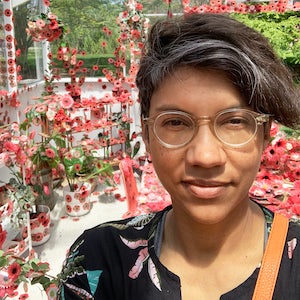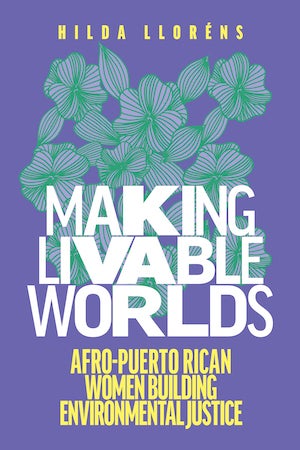Our faculty engage in cutting-edge research and innovative creative work every day as they bring new ideas to our students and communities locally and globally. We’re pleased to continue this monthly spotlight series featuring our faculty’s work through a question-and-answer style article published every month during the academic year.
Featured book: Making Livable Worlds: Afro-Puerto Rican Women Building Environmental Justice (U. of Washington Press, November 2021), by Professor Hilda Lloréns, Department of Sociology and Anthropology
Q: Can you give us a brief synopsis of Making Livable Worlds: Afro-Puerto Rican Women Building Environmental Justice?
Making Livable Worlds documents the lifeworlds of Afro–Puerto Rican women who are everyday builders, visionaries, believers, path breakers and problem solvers who don’t take no for an answer and who make a way out of no way. These are not women whose lives are regulated by despair. On the contrary, they are women whose kinship, community, and alliance-building practices illustrate that they understood long ago that the social world they inherited was a construction unequally stacked against them and thus they could set out to reconstruct it in ways that sustain their own, their family’s, and their community’s life and well-being. In this book I tell stories of perseverance, continuity, forging and maintaining good relations, and survival. The women documented here make good lives for their families and communities, often against all odds. Despite the social, economic, political, and environmental crises they might confront, shared in this book are the life herstories of socioecological justice-making, hope, solidarity, affirmation, creativeness, joy, and everyday practices of worldmaking.
Q: How does this book fit in with your research interests and passions?
Understanding the workings of gender, race and power in Puerto Rico, the Caribbean and among Latinx populations has been the central focus in my research and writing. In my academic work, I seek to shine a light and visibilize marginalized individuals, organizations, and movements, as well as to write them into cultural history and anthropological accounts that have long ignored the lives and world-making contributions of, in particular, Black and Afro-descendant women in the Americas. Making Livable Worlds does exactly this in that it visibilizes the tireless environmental justice and community-sustaining work carried out by Black and Afro-descendant women in Puerto Rico and the Puerto Rican Diaspora. At its core, this book, in line with my academic body of work, aims to de-pathologize and account for the lives of those who have been excluded from academic canons. And furthermore, who when included in academic accounts stand as exemplars of deficit and pathology rather than as innovators, creators, and builders of good lives for not only themselves, but for their communities and society.
Q: What surprised you when researching/writing this book?
I never cease to be surprised and incensed about the erasure or the relegation to the background of women’s significant contributions to the building and maintenance of communities and of society at large. Accounting for and narrating Black and Afro-descendant women’s initiatives and everyday practices of social and environmental justice has received only scant attention in Puerto Rico’s social science literature. Yet, Black, Afro-descendant, and socioeconomically disadvantaged women have long been at the forefront demanding environmental, social, economic, and political justice and rights for their families and communities. Even the very idea of engaging an environmental justice framework for thinking about the environmental harm experienced by Puerto Rican communities in the archipelago is owed to the pioneering work of two Afro-Puerto Rican women: University of Puerto Rico professor, Dr. Carmen Milagros Concepción and community activist and environmental attorney Ruth Santiago. This book centers them, as well as many other Afro-Puerto Rican women, firmly in the cultural history and social science literature about Puerto Rico’s environmental and social justice movements.
Q: For those reading this book, what do you hope is the main takeaway?
A main takeaway of Making Livable Worlds is the significant role that Black and Afro-descendant Puerto Rican women play in building and sustaining their communities and innovating positive change and a path forward. Additionally, readers will learn about the significance of local Black/Afro ecological knowledge to Afro-Puerto Rican
cultural practices and lifeways and the ways in which community women have long been at the forefront demanding that the ecosphere they depend on for sustenance and cultural integrity is protected. Finally, I hope readers understand that if the archipelagic ecosystem is to survive the devastation of anthropogenic climate change, that it is time to learn from Black- and Afro- Puerto Ricans. They have been stewarding their ancestral land and sea and passing down cultural lifeways and fugitive practices for generations, bringing them along wherever they go in the archipelago and in the diaspora.


